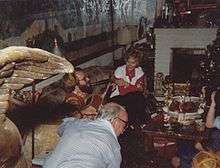Richard Thacker Morris
| Richard Thacker Morris | |
|---|---|
 Morris (foreground in white), at his Los Gatos home, during the late 1970s | |
| Born |
April 28, 1917 Ohio |
| Died |
March 17, 1981 (aged 63) Los Gatos, California |
| Occupation | Professor and author |
| Language | English |
| Nationality | American |
| Citizenship | United States |
| Alma mater | Ohio State University |
| Subject | Sociology |
| Notable works |
|
Richard Thacker Morris was a professor of Sociology at the University of California at Los Angeles. He was the author of The Two-Way Mirror: National Status in Foreign Students' Adjustment (1960),[1] as well as The White Reaction Study (1967),[2] an important work on urban race relations.
Academic career
Morris earned his Ph.D. at Ohio State University in 1952, where his doctoral dissertation employed the paradigm method in order to develop a general model of social stratification. In addition to his dissertation and two published books, his work also included numerous articles which appeared in such peer-reviewed journals as the American Journal of Sociology, American Sociological Review, Sociological Inquiry, and Sociology and Social Research. He taught at UCLA from 1953–1976, during which time he did research as a Fulbright scholar in the Netherlands (1963–64). During his tenure at UCLA, he also served as Acting Dean of the School of Social Welfare, and later as Chairman of the Department of Sociology. He was also an associate editor, as well as the book review editor, of American Sociological Review.[3]
References
- ↑ Catalog of the British Library of Political & Economic Science, London School of Economics and Political Science (retrieved on March 4th, 2010).
- ↑ Catalog of the British Library of Political & Economic Science, London School of Economics and Political Science (retrieved on March 4th, 2010).
- ↑ University of California: In Memoriam, 1985, "Richard T. Morris, Social Welfare: Los Angeles," by Maurice Connery, Eliot Rodnick, and Melvin Seeman (retrieved on March 13th, 2010).